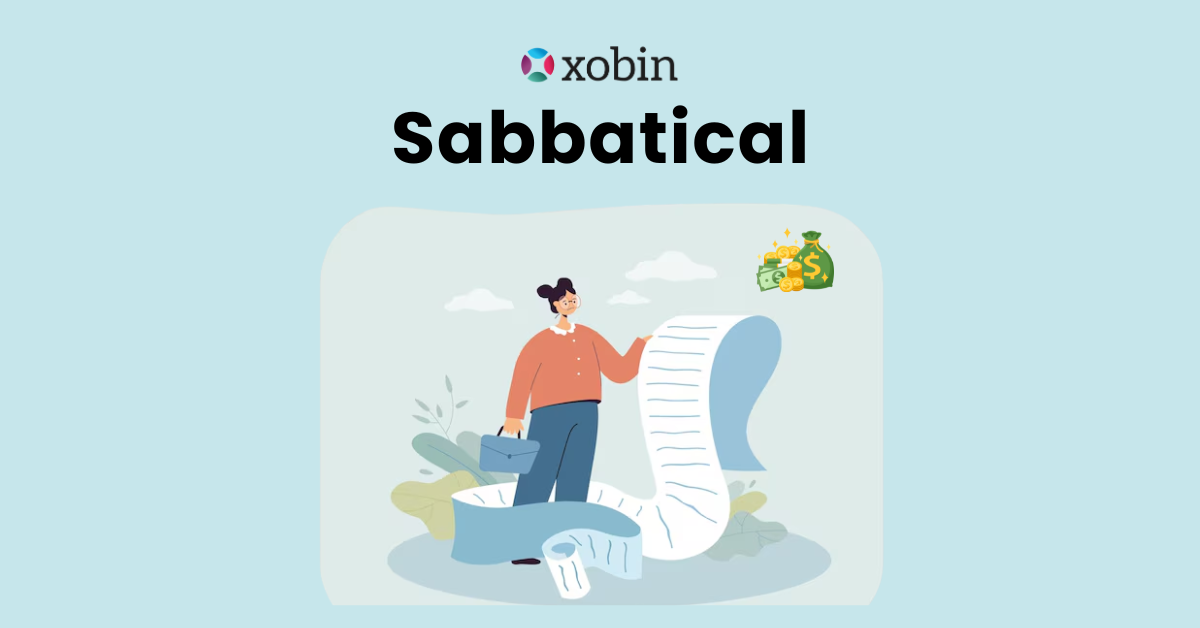XOBIPEDIA
HR Glossary

Table of Contents
Sabbatical leave is a strategic HR policy used by forward-thinking organizations to prevent burnout, retain top talent, and enable long-term workforce sustainability. As employee expectations around work-life balance, mental wellbeing, and career longevity rise, HR leaders must clearly understand how sabbatical leave works, why it matters, and how to implement it effectively.
TL;DR
- Sabbatical leave is an extended, approved break from work, usually offered after a fixed tenure.
- It helps reduce burnout, improve retention, and support employee well-being.
- Companies may offer paid, partially paid, or unpaid sabbaticals by policy.
- Employees use it for learning, travel, health, or personal growth.
- Forward-looking organizations use sabbaticals as a talent retention, engagement, leadership development, and employer branding strategy.
- A clear sabbatical policy helps avoid misuse and confusion.
What Is Sabbatical Leave?
Sabbatical leave refers to a long-term break from work that employees take after completing a specific period of service with an organization, commonly 5, 7, or 10 years. Unlike casual leave or earned leave, a sabbatical is designed for rest, personal growth, learning, research, or life priorities, while preserving the employee’s job security.
Traditionally associated with academia, sabbatical leave has now entered the corporate mainstream. According to a 2023 SHRM report, over 25% of large organizations globally offer some form of sabbatical or extended leave to combat burnout and improve retention. For HR leaders, it now serves as a proactive tool sustaining long-term employee performance instead of a reactive benefit.
Moreover, sabbaticals signal trust. When employees know they can step away without career penalties, loyalty and engagement increase significantly.
Why Do Companies Offer Sabbatical Leave?
At first glance, giving long breaks may sound risky. But here’s the twist: it often pays off.
1. Reduces Burnout and Stress
Burnout is like a phone battery that never gets fully charged. Sabbaticals help employees reset mentally and emotionally. As a result, they return with better focus and energy.
2. Improves Employee Retention
Replacing employees costs time and money. Employee retention strategies like sabbaticals show people they’re valued, which makes them stay longer.
3. Builds Future Leaders
When someone goes on leave, others step up. This creates natural opportunities for leadership development and succession planning.
4. Enhances Employer Branding
Offering career break options positions companies as people-first workplaces. That’s a big win in competitive talent markets.
💡 Pro Tip: Organizations that link sabbatical eligibility to performance and tenure see higher post-sabbatical retention than those offering ad hoc extended leaves.
Types of Sabbatical Leave
Not all sabbaticals look the same. Companies customize them based on culture and goals.
Paid Sabbatical Leave
Employees continue to receive full or partial salary. Although expensive, this option is popular among high-growth companies focused on long-term retention.
Unpaid Sabbatical Leave
Here, employees take time off without pay but keep their job security. This model is common and easier for businesses to manage.
Short-Term and Long-Term Sabbaticals
Short-term sabbaticals are usually 4–8 weeks. These are ideal for rest, skill-building, or personal projects. On the other hand, long-term sabbaticals can last 3–12 months. Often used for higher studies, research, or major life goals.
Purpose-Based Sabbaticals
Some organizations approve sabbaticals specifically for higher education, research, volunteering, caregiving, or health recovery. These structured sabbaticals often require a proposal and post-return knowledge sharing.
Flexible or Modular Sabbaticals
Modern companies are experimenting with modular sabbaticals, allowing employees to “bank” time over years. This aligns well with long-term workforce planning and flexible benefits strategies.

Who Is Eligible for Sabbatical Leave?
Eligibility depends entirely on company policy. However, most organizations set clear rules to keep things fair.
Typically, eligibility includes:
- Minimum tenure (for example, 5 or 7 years of service)
- Strong performance history
- Manager and HR approval
- Clear plan for how the time will be used
By setting these conditions, companies protect business continuity while rewarding loyalty.
What Can Employees Use Sabbatical Leave For?
This is where things get interesting. There’s no one-size-fits-all answer.
Employees often use sabbatical leave for:
- Upskilling or higher education
- Physical or mental health recovery
- Travel or cultural exploration
- Volunteering or social impact work
- Writing, research, or entrepreneurship experiments
Some companies even encourage learning-focused sabbaticals because new skills directly benefit the organization later.
Sabbatical Leave vs. Other Types of Leave
It’s easy to confuse sabbaticals with other leave types. Let’s clear the air.
| Aspect | Sabbatical Leave | Paid Leave | Career Break |
| Duration | Long-term (weeks/months) | Short-term | Long-term |
| Eligibility | Tenure-based | Annual | Often ad-hoc |
| Job Security | Yes | Yes | Not always |
| Strategic Intent | Retention & wellbeing | Rest | Personal choice |
| Employer Approval | Mandatory | Automatic | Case-by-case |
In short, sabbaticals sit at the intersection of growth, rest, and long-term commitment.
How to Create an Effective Sabbatical Leave Policy
A great idea without structure can backfire. That’s why a clear policy matters.
An effective policy should define:
- Eligibility criteria
- Duration and frequency
- Paid vs. unpaid rules
- Job security and role continuity
- Performance expectations after return
Additionally, companies should plan handovers carefully. This ensures work doesn’t pile up or disrupt teams.
Challenges of Sabbatical Leave (and How to Solve Them)
No policy is perfect. Sabbaticals come with challenges, but they’re manageable.
- Workload Redistribution: Teams may feel stretched. Solution? Temporary role rotation and early planning.
- Fear of Employee Exit: Some worry employees won’t return. In reality, structured sabbaticals increase loyalty when handled well.
- Skill Gaps: Use this time to identify and test internal talent. It’s a hidden advantage many companies overlook.
Sabbatical Leave in Modern Workplaces
Today’s workforce values flexibility more than ever. Especially among millennials and Gen Z, work-life balance benefits influence job decisions strongly.
Companies that blend sabbaticals with engagement programs and skills assessments stand apart. As a result, they hire talent and nurture it.
How Xobin Helps Organizations Build Future-Ready Talent
Offering sabbatical leave tells only half the story. However, the question asks what happens before and after.
That’s where Xobin comes in.
With Xobin’s pre-employment and employee skill assessment platform, organizations can:
- Identify high-potential employees eligible for sabbaticals
- Assess skills before and after career breaks
- Track readiness for leadership roles
- Make data-driven talent decisions
Want to evaluate internal talent readiness before approving long-term leaves? Xobin’s AI-powered internal assessments help HR leaders identify interim role coverage and skill gaps with confidence. Book a personalized demo today!
FAQs
1. Is sabbatical leave a legal requirement?
No. Sabbatical leave is not mandated by labor laws in most countries. It is a discretionary HR policy offered by organizations.
2. Is sabbatical leave usually paid or unpaid?
It can be either. Most organizations offer unpaid sabbaticals, while some provide paid or partially paid options for senior or high-performing employees.
3. Can an employer deny sabbatical leave?
Yes. Approval depends on business needs, eligibility criteria, and workforce availability.
4. Does sabbatical leave affect promotions or performance reviews?
It shouldn’t, if policies are well-designed. However, HR should clearly define how sabbaticals impact appraisal cycles.
5. How long is a typical sabbatical leave?
It usually ranges from 4 weeks to 12 months, depending on company policy and employee tenure.

Recommended Content

Video Interviews can simplify your hiring
Don’t let a packed schedule be a hindrance in recruitment. Use structured interviews with the power of video to screen applicants. Understand the communication skills, motivation, and job skills using video interviews.

Pre-employment Testing: The Complete Guide
Move over from pen-paper based tests and manually checked assignments to pre-employment assessments. Democratize your organization hiring by screening for skills before you interview.

How can Employers adapt to Remote Hiring
With most jobs going remote, your best applicants could be in Melbourne or Miami. From remote screening and virtual interviews to remote onboarding, Learn the best practices to get started.


